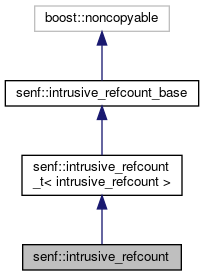senf::intrusive_refcount Class Reference
Reference count mixin for intrusive_ptr. More...
#include <senf/Utils/intrusive_refcount.hh>
Inheritance diagram for senf::intrusive_refcount:

Protected Member Functions | |
| intrusive_refcount () | |
 Protected Member Functions inherited from senf::intrusive_refcount_t< intrusive_refcount > Protected Member Functions inherited from senf::intrusive_refcount_t< intrusive_refcount > | |
| intrusive_refcount_t () | |
 Protected Member Functions inherited from senf::intrusive_refcount_base Protected Member Functions inherited from senf::intrusive_refcount_base | |
| intrusive_refcount_base () | |
| void | add_ref () |
| bool | release () |
Additional Inherited Members | |
 Public Types inherited from senf::intrusive_refcount_base Public Types inherited from senf::intrusive_refcount_base | |
| typedef unsigned | refcount_t |
| reference count type More... | |
 Public Member Functions inherited from senf::intrusive_refcount_base Public Member Functions inherited from senf::intrusive_refcount_base | |
| virtual | ~intrusive_refcount_base () |
| refcount_t | refcount () const |
| current refcount More... | |
| bool | is_shared () const |
return true if refcount() > 1 More... | |
Detailed Description
Reference count mixin for intrusive_ptr.
This class provides a simple internally managed refcount and supplies the boost::intrusive_ptr required interface. To make a class compatible with boost::intrusive_ptr, just derive publicly from intrusive_refcount.
Two additional benefits of using intrusive_refcount are
\li The object can access it's own refcount
\li It is valid and safe to convert a plain object pointer to an intrusive_ptr at any time
(not only after new)
This mixin class directly uses the default allocation strategy. If you want to customize the
reference couting, use \ref intrusive_refcount_t.
The interface of this class is defined in \ref intrusive_refcount_t and \ref
intrusive_refcount_base (the latter of which you should not use directly).
Definition at line 150 of file intrusive_refcount.hh.
Constructor & Destructor Documentation
◆ intrusive_refcount()
|
protected |
The documentation for this class was generated from the following file: